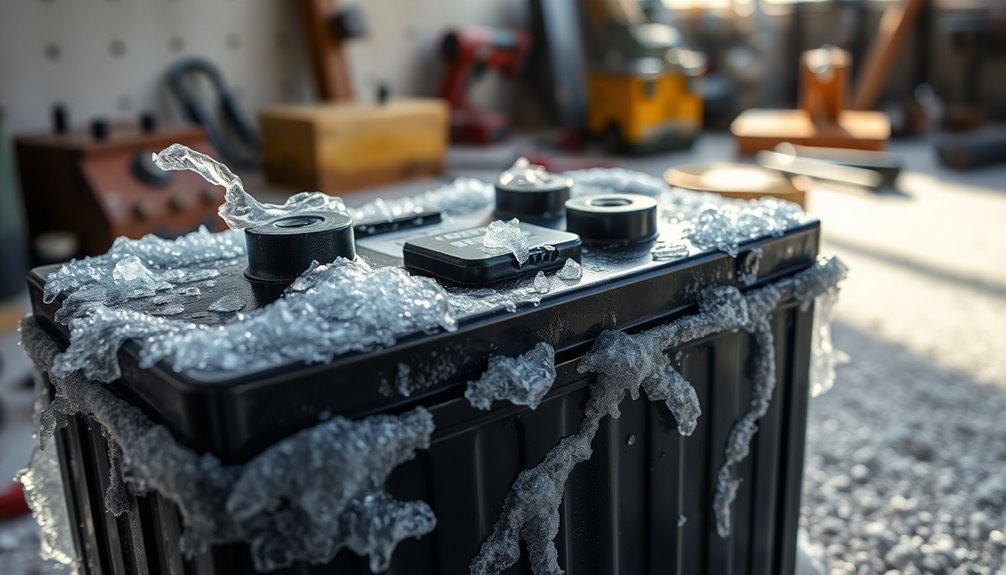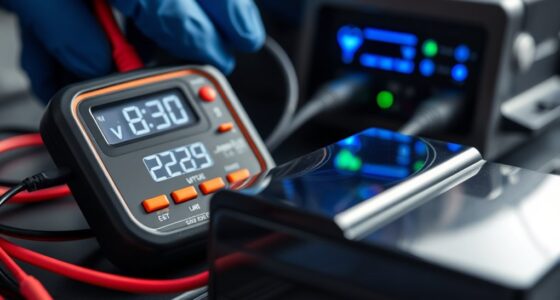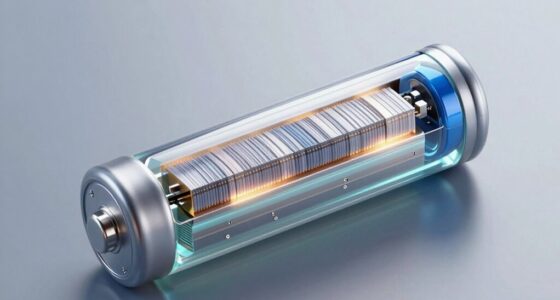Freezing a battery won't restore its performance or extend its lifespan; it often causes more harm than good. At low temperatures, chemical reactions slow down, increasing internal resistance and potentially leading to leaks or damage. While you might notice a temporary improvement, the charge diminishes quickly once the battery warms up. Additionally, charging a frozen battery is risky and can lead to dangerous failures. Instead of freezing, it's better to explore safer alternatives for battery restoration. If you want to know more about effective battery care and restoration methods, keep going to find valuable insights.
Key Takeaways
- Freezing does not restore battery charge or extend lifespan; it can lead to permanent damage instead.
- Charging frozen batteries risks thermal runaway, capacity loss, and potential explosions.
- While frozen batteries may initially show higher charge levels, this is not a reliable restoration method.
- Extended exposure to freezing temperatures can cause irreversible capacity loss and structural damage.
- Safer alternatives, like sulfation repair and controlled charging, are more effective for improving battery efficiency.
Effects of Freezing on Performance
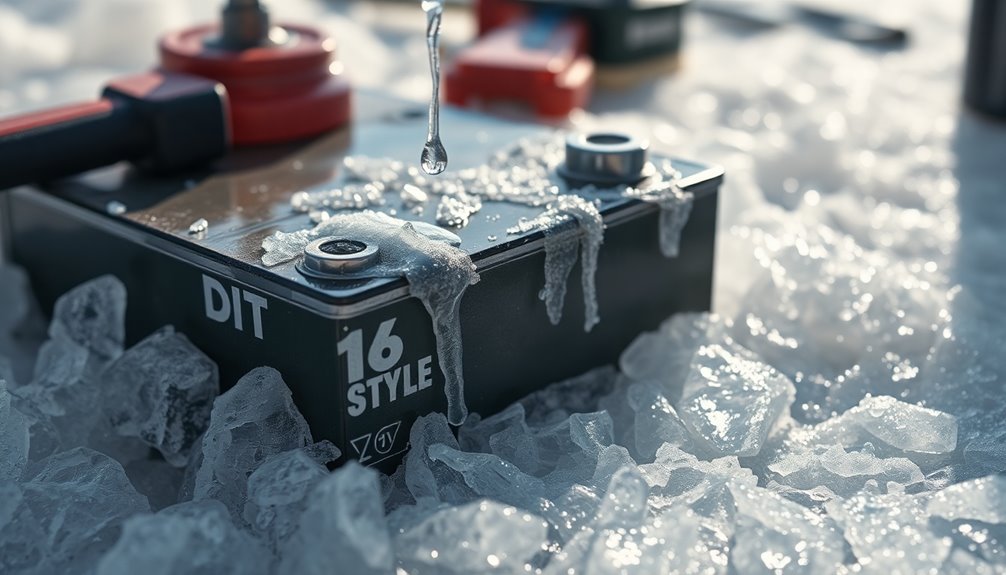
Freezing temperatures can severely impact a battery's performance, leading to significant efficiency losses. At low temperatures, chemical reactions within the battery slow down, which reduces its overall efficiency.
You'll notice that lithium-ion transfer rates drop, making it harder for the battery to generate energy. Instead of intercalating, lithium ions tend to coat the anode surface, a process known as lithium plating. This plating increases the electrolyte's resistance and limits the available lithium ions for electricity flow, resulting in a capacity reduction of 20-30%. Cold temperatures can lead to reduced efficiency and performance, which further exacerbates the issues caused by freezing.
Additionally, cold temperatures make the battery less mechanically stable, heightening the risk of sudden failure. The electrolyte thickens, becoming more viscous and less conductive, which increases internal resistance.
You might also encounter physical damage, like cracks or leaks in the battery components. In extreme cold, it's possible for the battery casing to rupture, and lithium plating can puncture separators, leading to dangerous short circuits within the cell.
Potential for Temporary Improvement
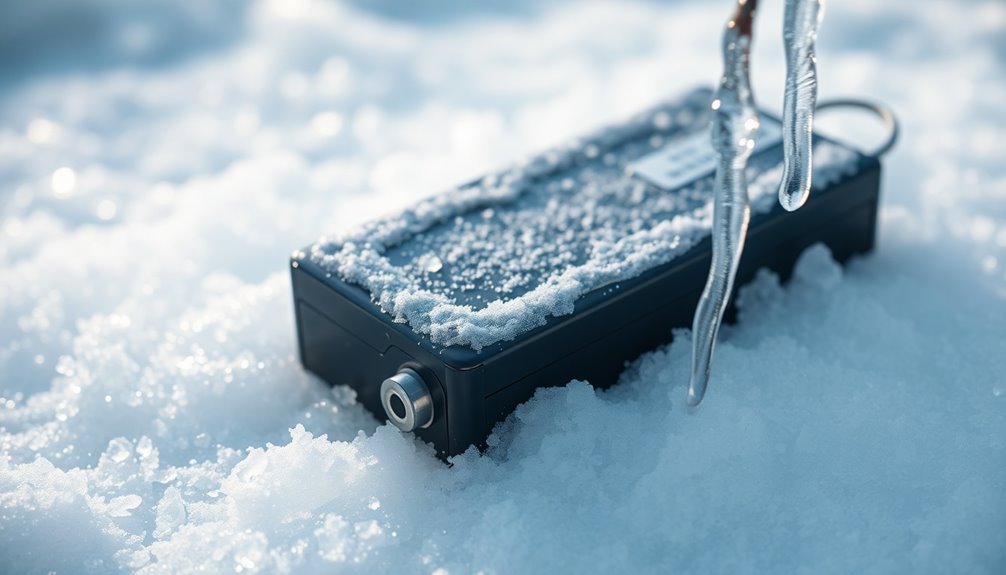
Storing batteries in a freezer can surprisingly offer a temporary boost in functionality for certain types of issues. Freezing slows down chemical reactions, which reduces self-discharge and helps maintain a charge over time. Batteries stored in the freezer often show a higher average charge compared to those left at room temperature. This method can temporarily revive weak or dead batteries, particularly those affected by heat or rapid charging.
When you freeze a battery, it's crucial to allow it to thaw before recharging. This process helps avoid permanent damage. You'll notice that revitalization is more effective if the battery gets very cold and stays that way for a while, like overnight. However, keep in mind that the restored charge mightn't last long, as batteries can lose a significant portion of their charge once removed from the freezer.
While freezing isn't a universal solution, it can work well for specific battery issues. Always check the battery's voltage and condition after freezing and recharging, and consider combining this method with other maintenance practices for better results. Additionally, it's important to note that lithium batteries experience reduced performance in cold conditions, which can impact their functionality.
Long-Term Impacts on Lifespan

The long-term impacts of exposing batteries to freezing temperatures can be quite detrimental. When you repeatedly subject your battery to low temperatures, you risk irreversible capacity loss. The cold slows down chemical reactions and reduces ion conductivity, which hampers the battery's ability to hold a charge. Additionally, the electrolyte becomes less effective at conducting ions, further exacerbating the decline in performance.
You'll notice that as temperatures drop, the usable capacity of lithium-ion batteries declines significantly. Charging your battery in freezing conditions can lead to permanent capacity loss, further diminishing performance. Over time, this decreased efficiency and capacity can severely shorten the battery's cycle life.
If you leave batteries idle in cold environments for extended periods, you could face permanent damage. Additionally, extreme cold can compromise the structural integrity of the battery. Components can contract, leading to cracks or ruptures in the casing, while lithium dendrites may form on the anode, increasing the risk of leaks.
All of these factors contribute to a significantly reduced lifespan. To maximize your battery's longevity, it's essential to keep it within optimal temperature ranges, as prolonged exposure to freezing conditions can lead to detrimental long-term effects.
Risks and Hazards of Freezing
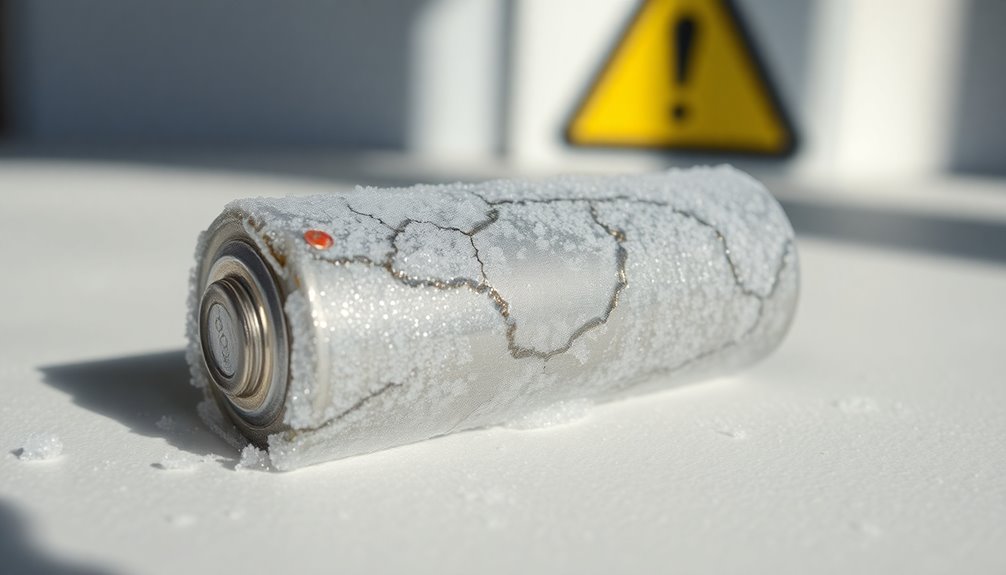
Exposure to freezing temperatures poses significant risks and hazards for batteries. When subjected to extreme cold, the battery casing can crack or rupture, leading to potential leaks and corrosion. The electrolyte can freeze and expand, causing internal structural damage that compromises the battery's functionality.
Physical damages like these can also create cracks and short circuits within the electrodes, connectors, and separators. You'll notice a marked reduction in performance and capacity as the electrolyte thickens, increasing internal resistance. This makes chemical reactions slower, resulting in diminished power output and efficiency. Additionally, the electrolyte viscosity increases in low temperatures, further affecting conductivity.
Charging a frozen battery not only slows down the process but can also trigger dangerous conditions like thermal runaway, which may lead to fire or explosion. Moreover, the risks escalate if you attempt to charge a frozen battery, as it can lead to permanent damage, including metallic lithium buildup on the anode. This instability increases the chance of overheating, further jeopardizing safety.
Finally, if you use or store batteries in extremely cold environments, you could face immediate operational issues, including complete failure and internal shorts, necessitating careful handling.
Proper Handling of Frozen Batteries
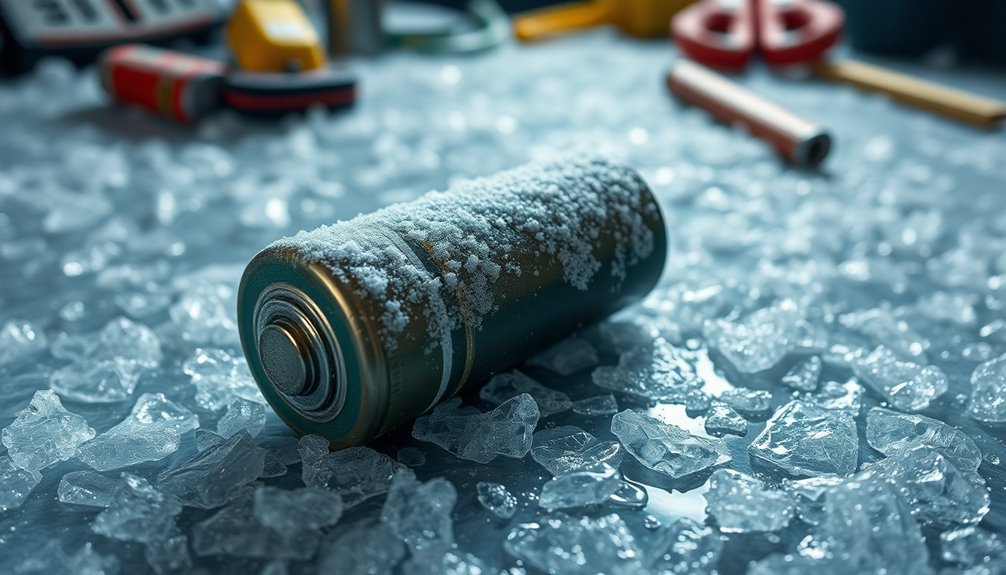
Properly handling a frozen battery is crucial to ensure safety and functionality. First, identify if the battery is indeed frozen by checking the inspection cap for ice or bulging. Look for any physical signs, like bulging at both ends], and determine if it's fully charged, as discharged batteries are more likely to freeze. Inspect for leakage and check the electrolyte level. Additionally, remember that age and condition of the battery can significantly affect its likelihood of freezing.
When it comes to thawing, use sunlight whenever possible. If that's not an option, carefully employ a hairdryer, avoiding direct contact with the terminals. A portable space heater can also help; aim it at the battery for about 30 minutes. Alternatively, bring the battery into a warm garage to allow for gradual warming. Make sure it reaches at least 40 degrees Fahrenheit before trying to jump-start it.
Always prioritize safety during this process. Wear protective gloves to shield against sulfuric acid and ensure your workspace is well-ventilated. Avoid leaning over the battery while jump-starting.
If any acid spills occur, neutralize them immediately with baking soda and water. Finally, keep the area well lit to monitor your actions effectively.
Storage Benefits in Cooler Temperatures
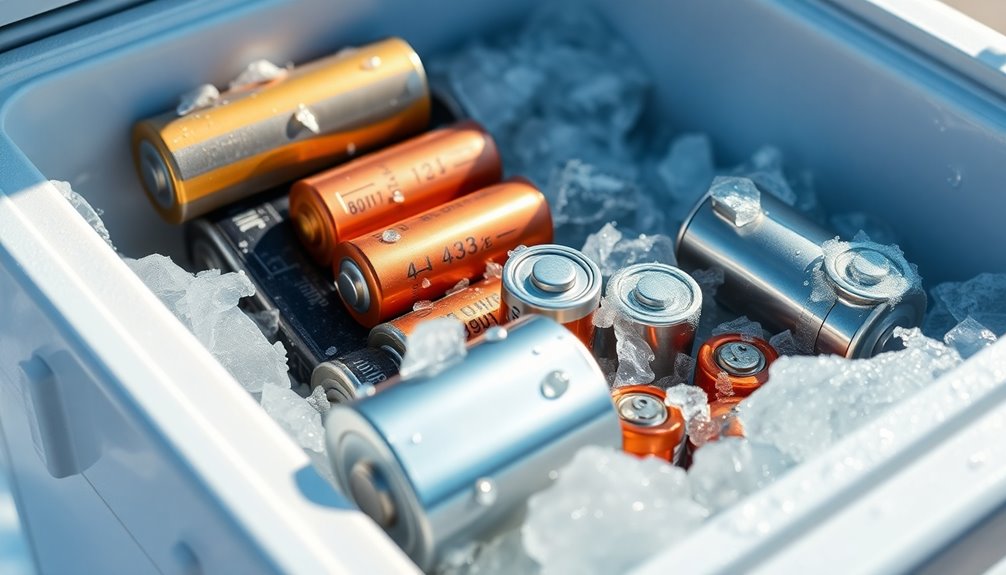
Maintaining batteries in cooler temperatures offers significant advantages for performance and longevity. Cooler conditions reduce the rate of chemical degradation in battery cells, which helps them retain their charge longer and maintain a higher average charge. By minimizing the growth of dendrites, you also lower the risk of internal short circuits and potential battery failure. This is especially beneficial for lithium-ion batteries used in electric vehicles, enhancing their reliability and overall performance.
Additionally, storing batteries in cooler temperatures slows down the aging process, effectively extending their lifespan. It prevents the contraction of components that can impede electron transfer, ensuring optimal capacity. Cooler storage helps avoid thermal runaway, a dangerous condition that can lead to overheating and possible fires. Temperature control is essential for safety in electric car manufacturing, as it mitigates fire and explosion risks associated with battery failures.
Transporting batteries in controlled cooler environments further safeguards their integrity. This method reduces the risk of damage from extreme temperatures or mechanical stress, ensuring they arrive in optimal condition.
For cold storage operations, lithium batteries shine, as they don't lose capacity in cold temperatures and can even be charged in subzero conditions, enhancing operational efficiency and reducing downtime.
Myths About Freezing Batteries
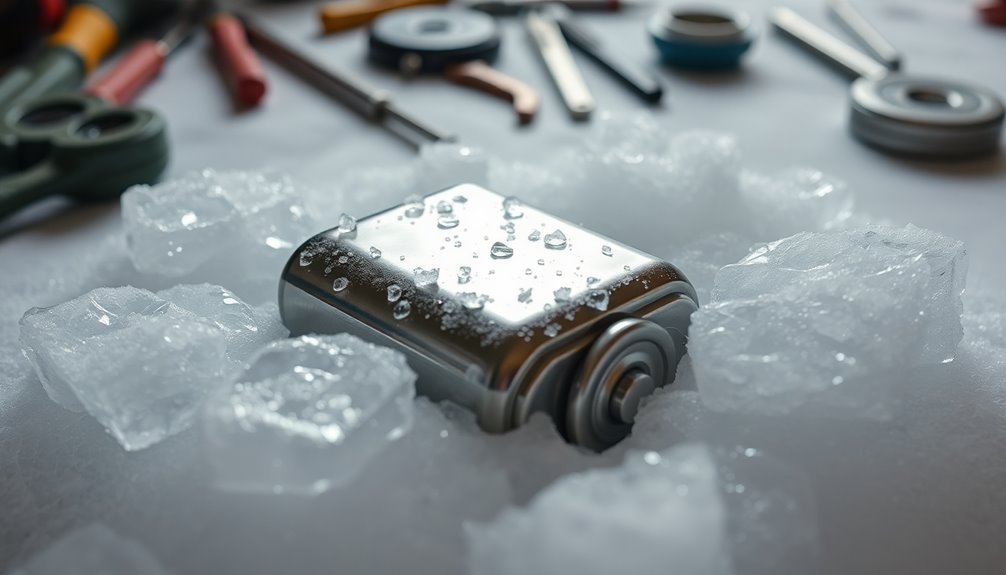
Many people believe that freezing batteries can restore their charge and extend their lifespan, but this is far from the truth. Freezing doesn't reverse the chemical reactions that drain a battery's power. Once a battery is dead, the chemicals inside are exhausted, and cooling it down won't rejuvenate them. In fact, freezing only slows down chemical reactions temporarily, failing to restore functionality. Additionally, freezing can further compromise battery reliability because extreme cold can damage the internal structure of the battery.
Moreover, freezing can damage the battery. The electrolyte may thicken, leading to leaks, while condensation can cause short-circuiting when you take the battery out of the freezer. For lithium-ion batteries, charging them while frozen can result in lost charge capacity and even explosions due to trapped gas.
It's also a myth that freezing enhances the lifespan of alkaline batteries. They're designed to retain charge at room temperature. Extreme cold can even lead to distorted or bulging battery cases, indicating potential hazards.
Alternatives to Freezing for Restoration
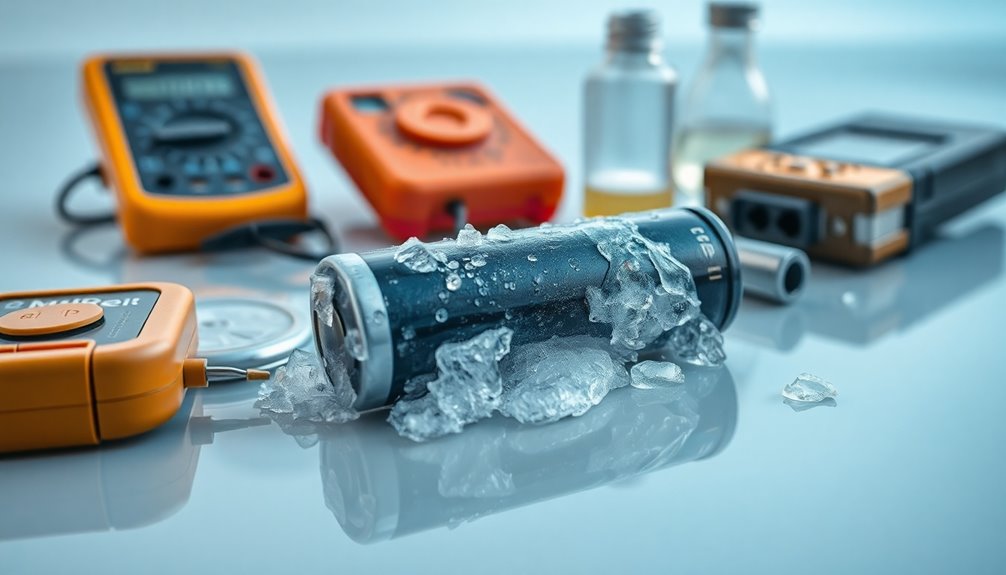
When your battery starts losing its charge, freezing it isn't the solution; there are far more effective alternatives to restore its functionality.
One method is sulfation repair, which uses a battery repair instrument to repeatedly charge and discharge the battery. This process targets sulfate crystals on the battery plates, significantly improving charging time and efficiency. Successful reconditioning can restore battery performance to near-new conditions and can potentially increase battery lifespan by up to 50% as well.
You could also try adding pure water or specific chemicals like sodium and potassium sulfate to the battery. This straightforward technique can restore up to 80% of the battery's capacity, especially in flooded lead-acid types.
After adding the chemicals, just remember to cycle the battery through charging and discharging.
Another option is equalization charging, which balances the cells within the battery using controlled overcharge. This method requires careful temperature management to avoid damage.
Lastly, pulse repair and cycle charging can help too, especially for lithium-ion batteries. By using specialized chargers to balance the cells, you can effectively restore capacity through repeated charge and discharge cycles.
These alternatives are safer and often more effective than freezing your battery.
Frequently Asked Questions
Can Freezing Batteries Improve Their Performance in Extreme Heat?
Freezing batteries won't improve their performance in extreme heat.
When you freeze a battery, it slows down chemical reactions, but that doesn't help when the temperature rises. High heat accelerates those reactions, leading to issues like water loss and sulfation, regardless of whether the battery was frozen beforehand.
To protect your batteries, store them in a cool, dry place and maintain them regularly, especially before facing extreme weather conditions.
What Types of Batteries Are Most Affected by Freezing?
You should be aware that certain batteries are more affected by freezing temperatures.
Lithium-ion batteries can lose capacity and face permanent damage if charged while cold.
Lead-acid batteries are particularly vulnerable, especially if not fully charged, leading to cracks or bulges.
Deep cycle and AGM batteries also suffer, with cold weather reducing their energy supply.
Proper storage and maintenance can help protect these batteries from freezing-related damage.
How Long Can a Battery Safely Be Stored in the Freezer?
You can safely store batteries in the freezer for a short period, ideally no longer than a few days.
However, it's important to ensure they're in airtight containers to prevent moisture damage.
Before using them, let the batteries warm up to room temperature to avoid any performance issues.
Remember, while cold storage can slow down discharge rates, it doesn't recharge batteries or significantly extend their lifespan.
Always follow manufacturer guidelines for best results.
Are There Specific Batteries That Should Never Be Frozen?
Yes, there are specific batteries you should never freeze.
Car and truck batteries, especially if partially discharged, can suffer damage from freezing. Flooded lead-acid batteries are particularly vulnerable, while AGM batteries perform better in cold.
Specialty batteries, like gel-filled options, also need protection from extreme cold to avoid issues.
Always store these batteries in a warm environment to maintain their performance and extend their lifespan.
Protect your batteries from freezing to ensure they work effectively.
What Symptoms Indicate a Battery Has Been Damaged by Freezing?
When a battery's been damaged by freezing, you might notice several symptoms.
Your electronic devices may struggle to function, headlights could dim, and the car clock might reset.
You might see warning lights illuminate on the dashboard, indicating battery issues.
Starting the engine could become difficult, with increased cranking time.
Physical signs like cracks, bulging sides, or no liquid sound when moving the battery can also indicate severe internal damage.
Conclusion
In conclusion, while freezing a battery might offer a temporary boost in performance, the risks often outweigh the benefits. It can lead to long-term damage and potential hazards. Instead, consider storing your batteries in a cool, dry place and exploring other restoration methods. By taking proper care of your batteries, you'll extend their lifespan without resorting to freezing, which is more myth than miracle. Keep your batteries safe and functioning optimally with better practices.

